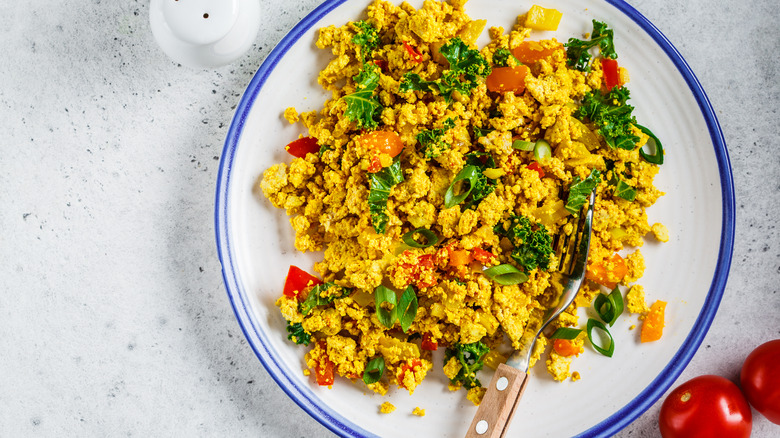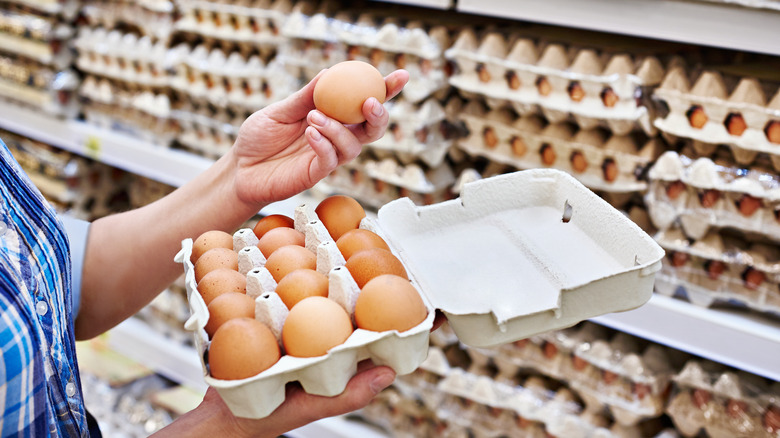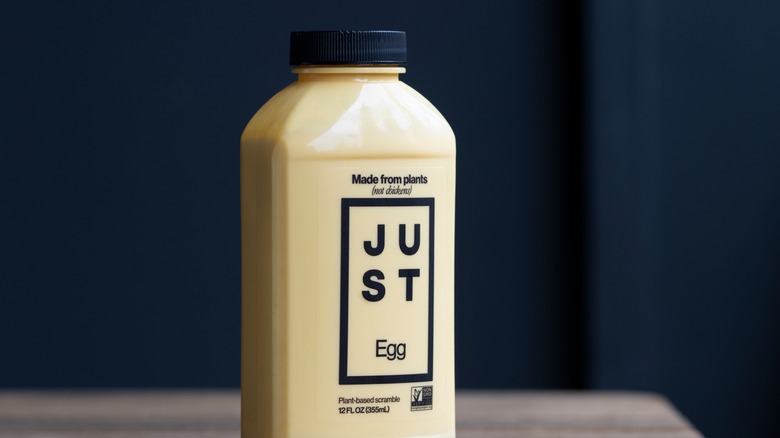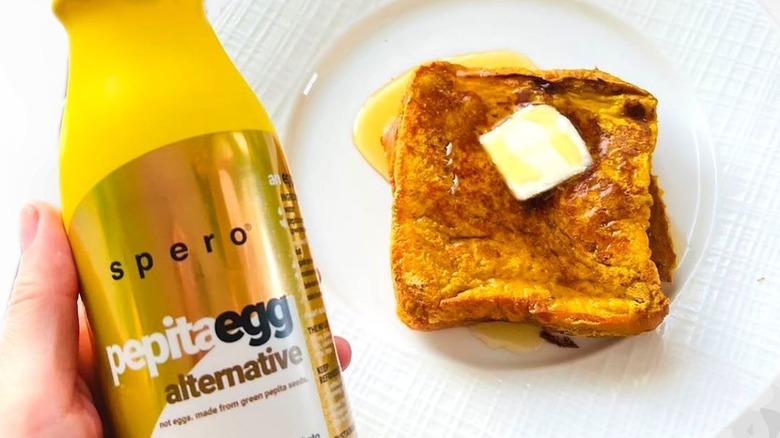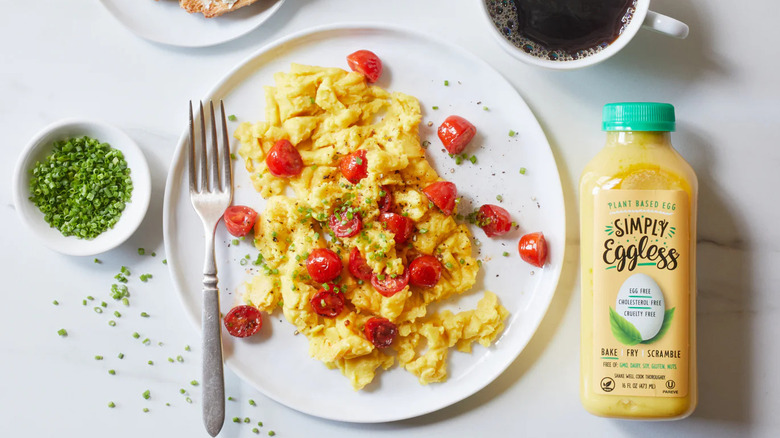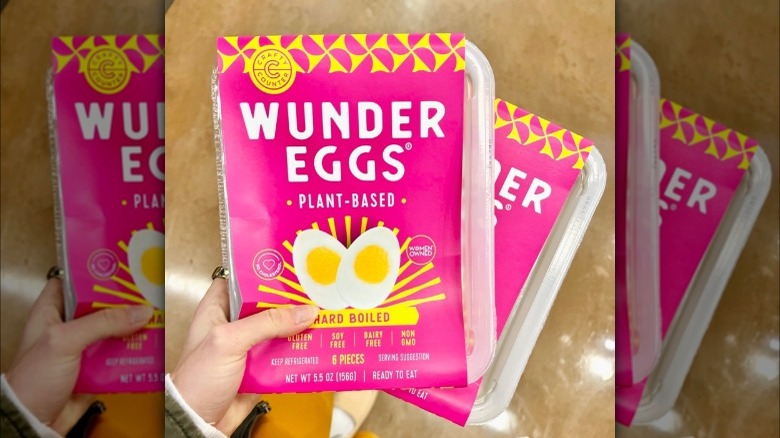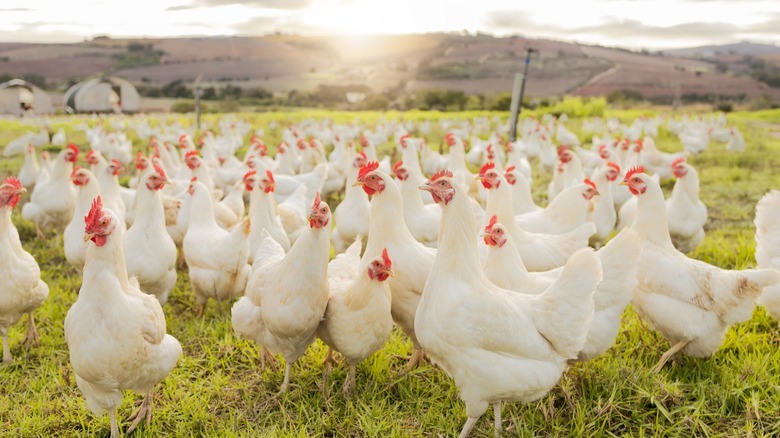What Are Vegan Eggs And Are They Actually Nutritious?
Two words: vegan eggs — they're almost contradictory. By nature, the two could not possibly work. But as egg prices soared over the past year, the vegan egg conundrum has piqued the curiosity of more than just the plant-based and egg intolerant, shifting the eyes of frugal shoppers everywhere. While they're technically not eggs, vegan eggs are designed to mimic the look, taste, and binding abilities of their poultry counterparts — without any of the birds or the associated bird flu.
As the curiosity for plant-based foods has increased, so has the variety of products on the market — and vegan eggs are no exception to that. From more basic alternatives like JUST Egg and Simply Egg to innovative Wunder Eggs and YoEgg, consumers can get their hands on every form of the plant-based egg they need, whether it's vegan egg whites, egg yolks, or both. Products range in form as much as they do in uses, allowing vegans, flexitarians, and egg-intolerant eaters alike the joy of an egg-free morning quiche or late-night brownies.
But with all these options on the market, one has to wonder: do they stand up to chicken eggs nutritionally as well as they do in the kitchen?
Nutrition of chicken eggs
Eggs have been a dietary staple for about 6 million years and for good reason. Per data from the USDA, one large egg delivers about 80 calories, contains about 5 grams of fat, and provides about 6 grams of protein — and it's also full of nutrients like vitamins A, D, E, and B12, choline, iron, selenium, folate, and carotenoids. They're particularly beneficial due to their amino acid content, containing all of the nine essential amino acids that our bodies cannot produce on their own and making them a complete protein source.
Additionally, the healthy fats found in eggs help your body absorb all of the egg's nutrients while providing their own benefits. When fed a diet of flaxseeds, eggs from hens are enriched with every type of Omega-3 polyunsaturated fats, which has been found to help control the side effects of eczema, arthritis, and lupus, and potentially prevent stroke, cancer, and even heart disease. This goes against the common misunderstanding that the cholesterol in eggs is bad for your heart, to the point that the FDA may soon deem them as "healthy."
While an average-sized egg contains about 186 milligrams of cholesterol, it doesn't actually impact your blood pressure. That's because the body is able to adjust how much it produces, depending on how much you get from your food. What you should really look out for are saturated fats — 1 egg usually has about 1.64 grams of it.
JUST Egg
JUST Egg is arguably none of the most popular vegan egg alternative products on the market. Sold in the form of a 12-ounce bottle, ready to be shaken and scrambled or baked, and in frozen folds, which can easily be popped in the toaster and thrown on your breakfast egg and cheese, JUST Egg has made what was previously thought of as impossible, possible.
Nutritionally, their products are comparable to hen eggs, with 5 grams of protein, 5 grams of fat, and 1 gram of carbs, in just 70 calories. However, where they fall short is that they aren't fortified with any of the vitamins that you'd get from a regular egg and the fact that they contain about 170 milligrams of sodium per serving.
Made from a base of mung beans, emulsifying oils, water, and seasonings, JUST Egg is better than hen eggs in the fact that they contain about a gram of fiber and no cholesterol. Of course, being vegan, they also omit the associated animal cruelty of factory-farmed eggs and the attributed environmental impact.
Zero Egg
Zero Egg is another popular egg replacement on the market that comes in a similar style as JUST Egg. Zero Egg's product scrambles, bakes, binds, and fluffs like a real egg, and it's made from a blend of plant proteins, so you can take solace in knowing that no hens were harmed in the process. However, using a unique mix of soy, potato, pea, and chickpea proteins, Zero Egg's nutrition profile is slightly different than that of JUST Egg — and regular hen eggs, for that matter.
The egg replacement products from Zero Egg contain slightly less protein than a regular egg, with 2 grams of it per serving, along with 2 grams of carbohydrates and 3 grams of fat. While they do have the added benefits of potassium, calcium, and iron without the worry of cholesterol, you still miss out on the healthy fats, amino acids, and other vitamins that are found in regular eggs.
Again, all that being said, Zero Egg's products claim to be much more environmentally friendly and use 93% less water and energy, need 92% less land, and emit 59% fewer greenhouse gas emissions.
Spero Pepita Egg
Primarily known for their plant-based cream cheeses, Spero's Pepita Egg replacement is one of the newer egg alternatives on the market. However, like the brand's cream cheese alternatives, their vegan egg replacement stands out because it contains no gums or allergens.
In fact, their recipe contains just seven ingredients: water, pumpkin seeds, salt, garlic powder, mushroom extract, beta carotene (natural color), and nisin (natural preservative). Additionally, with 6 grams of protein per serving, Spero's alternative is one of the only ones that deliver the same amount of protein as a large egg.
All that being said, while Spero's Pepita Egg alternative does deliver potassium, zinc, and iron, you still miss out on many other nutrients and vitamins that are found in eggs — from vitamins A, D, E, and B12 to choline, selenium, folate, and carotenoids. But, on the other hand, you can bet their product saves a lot more energy, resources, and carbon emissions.
In fact, Spero's product claims to emit 99% less carbon dioxide, use 87% less water, and require 86% less land. Seeing that it's totally vegan and allergen-free, you can also bet that no hens, or your allergy-laden friends, will be harmed in the process.
Simply Eggless
Along with JUST Egg, Simpy Eggless is one of the more popular egg alternatives you can find at Trader Joe's. Only their approach to the vegan egg game is slightly different. Rather than simply providing a bottled liquid option and a frozen patty option, they've partnered with Beyond Meat to create plant-based versions of breakfast staples like their egg-less egg bites and sausage egg and cheese sandwiches.
Made from a base of lupin bean protein, a regenerative crop also found in vegan Chocho protein powder, all of the Simply Eggless products are packed with 3 grams of protein per serving — plus more if they include Beyond Meat.
Focusing on their basic liquid egg alternative, however, the Simply Eggless option is unique in that each serving is infused with 3 grams of prebiotics. Also, containing just 20 milligrams of sodium, it's one of the few egg alternatives that have less sodium than a hen egg, per data from the USDA.
They also contain about 3.5 grams of fat and 3 grams of carbs, but besides that, and the fact that the product contains some calcium, there are still a lot of nutrients and vitamins you'd get from regular eggs that you're missing out on. Still, if you're allergic to eggs and don't partake in animal foods, this is a good alternative that's easy to get your hands on.
Wunder Egg
Wunder Eggs are a newer egg alternative on the market, but instead of filling the void of an egg scramble or omelet, these vegan eggs come in the hard-boiled form. Featured in VegNews' best vegan products coming in 2023, Wunder Eggs are actually the first plant-based egg product of its kind. And the ingredient list is surprisingly both short and legible. Made from almonds, cashews, and coconut milk, these plant-based hard-boiled eggs are certainly not nut-allergen friendly, but they are hen-free, making them vegan and egg-allergen-friendly.
Nutritionally, Wunder Egg's plant-based hard-boiled eggs are a bit underwhelming. In a serving size of two eggs, you get about 3 grams of protein, 6 grams of fat, and about 130 milligrams of sodium — meaning that each egg only contains about half the nutrients of a regular egg. While they do come with added benefits like potassium, iron, and calcium, they still don't have any of the other vitamins and nutrients that chicken eggs are naturally full of. But, there is the benefit of not having to go through the trouble of boiling and peeling the hard-boiled eggs yourself.
YoEgg
YoEgg is another unique vegan egg alternative you can find in restaurants on the West Coast. However, unlike other egg alternatives that can only be scrambled and baked or hardboiled, YoEgg is the first plant-based alternative to poached and sunny-side-up eggs — completing your avocado toast with that silky, golden, and runny egg yolk. Made from a base of chickpeas and soy, YoEgg's product contains 3 grams of protein per egg, 2 grams of fiber, and 1 gram of fat in just 40 calories.
While YoEgg's products do contain less sodium than a regular hen egg (with just 1 milligram per serving), they don't, on the other hand, deliver anything in the vitamin department. With no vitamin A or C, iron, or calcium, the running theme seems to be that hen eggs contain a lot of natural benefits that vegan alternatives can't replicate. Of course, the same can be said about the sustainability of vegan eggs.
The environmental side
In recent years, the poultry and egg industry has made a significant effort to reduce their impact on the climate — resulting in the use of 31% less water and the production of 71% fewer greenhouse gas emissions. Even so, using chickens puts them a lot further behind in the race for carbon neutrality. Advancements in feed efficiency, hen housing, and manure management have greatly improved the livelihoods of hens in egg production facilities, prolonging their life while simultaneously producing more eggs. Still, things aren't perfect — and not all hens are raised similarly.
The sad truth is that, in the U.S., the majority of eggs come from hens raised in stressful environments on factory farms — with only 1% raised in small flocks on pastures, where they can exhibit all of the natural behaviors they would in the wild. Whether they're raised in "cage-free" environments or in traditional battery cages has little difference for the lives of factory-raised hens or the environment. Additionally, CAFOs, or concentrated animal feeding operations, like the ones that conventional hens are raised in, exhibit conditions of poor animal welfare.
Fortunately, pasture-raised hen eggs — which a 2010 study published in the Journal of Renewable Agriculture and Food Systems found to contain more vitamins, minerals, and fatty acids than factory-farmed eggs — are slowly becoming more accessible. Still, when it comes to the environment, vegan eggs are a clear winner. They use a lot less land and water and contribute to much fewer carbon emissions.
The verdict
While most vegan egg alternatives on the market today do an excellent job of delivering a comparable amount of protein, carbs, and fat as a regular egg would, where they seem to fall short is in the diversity of vitamins and nutrients they provide. Hen eggs are naturally rich in vitamins A, D, E, and B12 and contain a beneficial amount of choline, iron, selenium, folate, and carotenoids — a powerhouse of benefits that vegan eggs simply haven't replicated yet.
Even so, the alternatives available today perform impressively in nearly all mediums regular eggs would typically be used. They are an excellent option for those who simply want to enjoy the taste of eggs without any of the associated sensitivities, allergic reactions, environmental consequences, or animal cruelty. Whatever your reason is, there's sure to be a vegan egg alternative out there for you.
On the other hand, if you're someone who eats eggs and wants to continue reaping the benefits but is also looking to cut out the number of animal products in your diet, vegan eggs are an easy way to do so. In fact, switching to an egg alternative has its benefits, and by simply alternating between hen eggs and vegan eggs, you can actually offset the carbon footprint of your egg consumption — all while diversifying your protein intake with the addition of plant-based sources.
